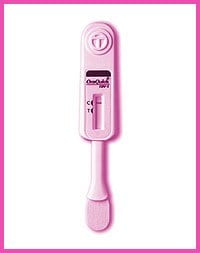A new HIV test now available in the States could let you check your HIV-status over your lunch break.
The OraQuick HIV-1/2 test, approved by the US Food And Drug Administration on Mar 26, delivers results in 20 minutes, as opposed to the several weeks of waiting that comes with the test currently used in Canada. The new test uses saliva instead of blood to test for the HIV virus, and unlike the blood test, OraQuick doesn’t require a trained technician to use it, so it could someday be available over the counter.
“Many people are anxious to get their hands on it,” says Ron Spair, chief financial officer of OraSure Technologies, the Pennsylvania-based company that designed the test. Spair cites increased safety as one of the advantages of the new test. “Blood has the potential for infection,” he says. “The rapid test is an antibody test, it tests for antibodies in the oral fluid. Where the blood has the virus itself, oral fluid usually does not unless there is an open wound.”
Public health officials in the United States are hoping the quicker, easier test will encourage more people to get checked. But Tanya Jewell, the Ontario gay men’s HIV prevention campaign coordinator with the AIDS Committee Of Toronto (ACT), has her doubts; she doesn’t think that it’s the method of testing that stops people from checking their status.
“When people go to get tested, they’ve made a conscious decision to get tested and I don’t think a blood test is going to deter them,” says Jewell.
Last year, ACT utilized a similar saliva test as part of the Ontario Men’s Health Survey. Administered in bars, bathhouses and community group meetings, men were given a survey to fill out and then given the option of a saliva test. The results were not given to the participants.
“It was anonymous, so we weren’t diagnosing anyone,” says Jewell. “We just asked them if they knew their status and then we tested them to find out [if they were right].”
Chris A Cavacuiti, on-call physician for Casey House and University Of Toronto faculty member specializing in HIV primary care, says there are good and bad aspects to the new method of testing. He sees the speed as a plus since many people are reluctant to return to the clinic for their results.
“With the people who request testing, there’s a window period that causes them to be anxious,” says Cavacuiti. “They have difficulty coming back and we have a policy that we won’t give results over the phone.” The test also helps people avoid needlestick injuries that occasionally occur with giving blood.
But the problem with the test, says Cavacuiti, is with its accuracy. He says the current method of HIV testing is more accurate, in terms of preventing both false positive and negative results.
Other fast HIV tests have been found faulty in the past. In April 2002, Health Canada recalled the Fast-Check HIV test, produced by Montreal’s BioChem Immunosystems, after a BC trial found the test failed to detect HIV in two out of 14 cases. The blood-based test, which returned results in 15 minutes, had been in use at the Hassle Free clinic for several months at the time that it was recalled.
Beyond questions of accuracy, another drawback to the OraQuick test is that only identifies the more common HIV-1 strain and not HIV-2, which is more common in western Africa. OraSure is currently seeking a licence to certain HIV-2 patents held by Bio-Rad Laboratories.
“We’re not approved at the moment for the detection of HIV-2,” says Spair. “We can test for it using other methods, such as finger-stick, venus, plasma. Right now we’re only allowed to test for HIV-2 in Africa [using the rapid saliva test].”
The OraQuick test is not currently available in Canada, and an application to Health Canada for approval has yet to be made. But Spair says there are long-term plans to get the rapid test approved both internationally and for use over the counter.
If the test is approved in Canada, Cavacuiti says he doesn’t think it would make much of an impact. “A small group, maybe five percent, probably less, would be willing to do the testing if they knew it wouldn’t take as long to get results,” says Cavacuiti.

 Why you can trust Xtra
Why you can trust Xtra


